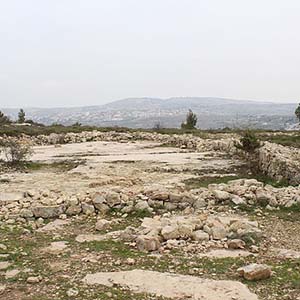Beth-el

Bible References
Genesis 12:8
Genesis 13:3-4
Genesis 28:11–19
Genesis 31:13
Genesis 35:1–8
Joshua 15:30
Joshua 12:16
Joshua 16:1
Joshua 19:4
Judges 1:22–23
Judges 20:18–31
Judges 21:2, 4
1 Samuel 7:16
1 Samuel 13:2
1 Samuel 30:27
1 Chronicles 4:29–30
2 Chronicles 13:19
1 Kings 16:34
2 Kings 2:2–3
2 Kings 10:29
2 Kings 17:27–28
(the house of God)
- Well-known city and holy place of central Palestine, about 12 mlles north of Jerusalem. If we are to accept the precise definition of Genesis 12:8 the name of Bethel would appear to have existed at this spot even before the arrival of Abram in Canaan (Genesis 12:8; 13:3-4). Bethel was the scene of Jacob’s vision (Genesis 28:11-19; 31:13). Jacob lived there (Genesis 35:1-8). The original name was Luz (Judges 1:22-23). After the conquest Bethel is frequently heard of. In the troubled times when there was no king in Israel, it was to Bethel that the people went up in their distress to ask counsel of God (Judges 20:18, 26, 31; 21:2). Here was the ark of the covenant (Judges 20:26-28; 21:4). Later it is named as one of the holy cities to which Samuel went on circuit (1 Samuel 7:16). Here Jeroboam placed one of the two calves of gold. Toward the end of Jeroboam’s life Bethel fell into the hands of Judah (2 Chronicles 13:19). Elijah visited Bethel, and we hear of “sons of the prophets” as resident there (2 Kings 2:2,3). But after the destruction of Baal worship by Jehu, Bethel comes once more into view (2 Kings 10:29). After the desolation of the northern kingdom by the king of Assyria, Bethel still remained an abode of priests (2 Kings 17:27-28). In later times Bethel is named only once under the scarcely-altered name of Beitin. Its ruins still lie on the right hand side of the road from Jerusalem to Nablus.
- A town in the south part of Judah, named in Joshua 12:16 and 1 Samuel 30:27. In Joshua 15:30; 19:4; 1 Chronicles 4:29-30 the place appears under the name of Chesil, Bethul, and Bethuel.
- In Joshua 16:1 and 1 Samuel 13:2 Mount Bethel, a hilly section near Beth-el, is referred to.
Smith's Bible Names Dictionary (1866)